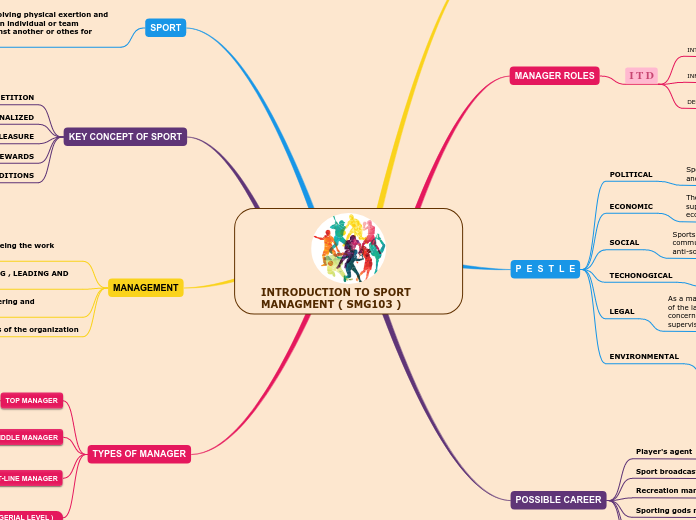
INTRODUCTION TO SPORT MANAGMENT ( SMG103 )
P O L C
PLAN
Defining goals , establishing strategies to achieve goals, and developing plans to coordinate activities
ORGANIZE
Arranging and structuring work to accomplish organizational goals
LEAD
Working with and through people to accomplish goals
CONTROL
Monitoring , comparing , and correcting work
MANAGER ROLES
I T D
INTERPERSONAL
The managerial roles in this category involve providing information and ideas
INFORMATIONAL
The managerial roles in this category involve processing information
DECISIONAL
The managerial roles in this category involve using information
P E S T L E
POLITICAL
Sports diplomacy can overcome cultural different and unite people
ECONOMIC
The sports sector contribute to the economy by supporting employment snf adding to the economic output due to commercial activities.
SOCIAL
Sports programs can create stable and inclusive communities , and they are an alternative to anti-social behavior
TECHONOGICAL
Technology has meant that managers now carry out their work in many different ways.
LEGAL
As a mangers , you need a basic understanding of the laws relevant to your responsibilities concerning and recruiting , hiring , training , supervising and firing
ENVIRONMENTAL
Managers face new challenges brought on by a changing environment. These include intenses competition and new performance standards that every management team must now achieve
POSSIBLE CAREER
Player's agent
Sport broadcasting
Recreation management
Sporting gods manufacturers
Stadiums and arena management
Sport marketing agencies
SPORT
An activity involving physical exertion and skill in which an individual or team competes against another or othes for entertainment.
KEY CONCEPT OF SPORT
COMPETITION
INSTITUTIONALIZED
FUN AND PLEASURE
INTRINSIC REWARDS
HISTORY AND TRADITIONS
MANAGEMENT
Coordinating and overseeing the work activities of others
PLANNING , ORGANIZING , LEADING AND CONTROLLING
The process of administering and coordinating resources
Achieve the goals of the organization
TYPES OF MANAGER
TOP MANAGER
Individual who are responsible for making decisions about the direction of the organization and establishing policies that affect all organizational members
MIDDLE MANAGER
They are responsible for translating the goals set by top management into specific details
FIRST-LINE MANAGER
First-line managers are the lowest level of management and manage the work of nonmanagerial individuals who are directly involved with the production or creation of the organization's product
OPERATIVES ( NONMANAGERIAL LEVEL )
People who work directly on a job or task and have no responsibility for overseeing the work of others
